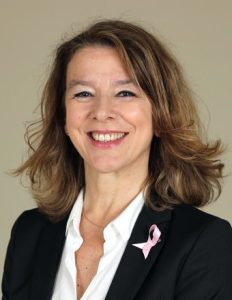Meet the Trainer – María del Mar Vivanco

Meet María del Mar Vivanco, Team Leader at CIC bioGUNE in Bilbao, Spain. Maria is one of the organisers of the EMBO Practical Course: Techniques for Mammary Gland Research (1 – 6 March 2020).
What is your research focus?
I am interested in cancer heterogeneity, why some cells respond to therapy while others do not, thus contributing to development of resistance and metastasis. In particular, I am intrigued about the complex effects of transcription factors, which are required for normal physiology of the mammary gland and are also implicated in tumorigenesis and development of resistance to therapy in breast cancer.
Why did you choose to become a scientist?
When I was young I had a variety of interests – psychology, physics, art, biology… However, I was intrigued by science and anything related to DNA and its regulation. Then I did my PhD at EMBL Heidelberg (Gene Expression Programme) and discovered the opportunities in research for identifying problems, looking for solutions and the thrill of finding some of the answers…and I was hooked!
Where do you see this field heading in the future?
Despite significant progress in cancer research and clinical advances, breast cancer still is the most commonly diagnosed cancer – one in eight women will develop this disease during their lifetime – and it claims the lives of more women than any other cancer, plus men can also get breast cancer. This highlights the unmet clinical need for improved strategies for prevention, early detection and more efficient and specific treatments in order to accelerate progress and help more patients survive the disease.
One of the features that characterises breast cancer is its heterogeneity, both among patients and within each patient tumor. This heterogeneity is found at molecular, phenotypic and functional levels, complicating diagnosis and challenging approaches to therapy. Currently, huge efforts are dedicated to understanding this heterogeneity at all levels, including at single-cell resolution, which is anticipated to open new possibilities for more efficient and specific anti-cancer therapies.
How has training influenced your career?
Doing my PhD at EMBL marked the way I envision science, and this vision was reinforced and developed further at UCSF. Science can – and SHOULD – be fun. Later on, funding struggles and the current publishing madness have somehow taken a toll on the fun element, so I just have to remind myself sometimes that science is still exciting!
If you weren’t a scientist, what would you be?
An artist.
You are one of the organisers of the EMBO Practical Course: Techniques for Mammary Gland Research (1 – 6 March 2020). What is the greatest benefit of the course for the scientific community and what could the techniques in this course be used for in the bigger picture?
Some of the techniques practiced at this course are specific for the mammary gland and thus it provides a solid base for researchers starting in this field. In addition, there is a significant emphasis on imaging and comparison of mouse and human studies, the two major systems for looking at normal physiology and cancer research that, when combined, offer great insights into this heterogeneous disease. In addition, having the opportunity to work alongside other trainees contributes to the establishment of a network that may be helpful in the future. Cancer is a very complex problem, and having collaborators with different views and expertise will be very useful in your career.
Interested in this course? Submit your application by 8 December!